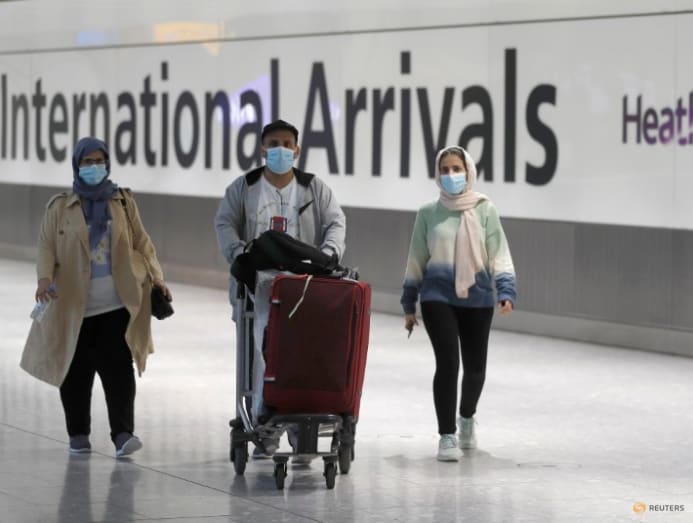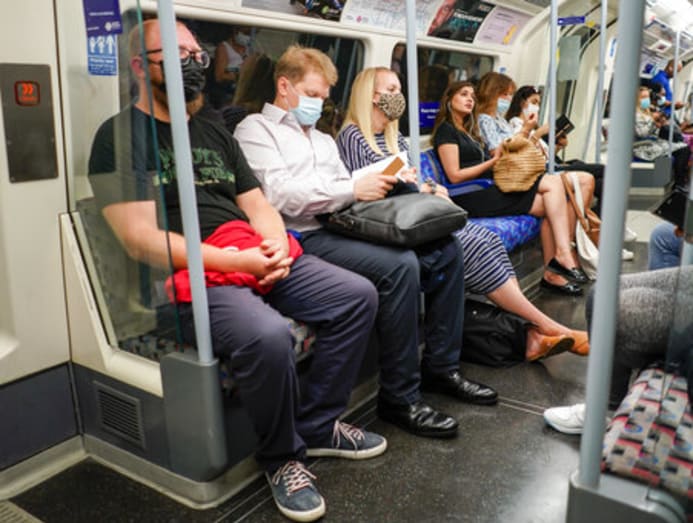Commentary: Many G20 countries have been COVID-19 super spreaders
OXFORD: G20 leaders will run across in Rome at the end of Oct, in part to discuss how to deal with future pandemics. Just the truth is that their countries' actions accept largely fuelled the current one.
Many G20 countries take been COVID-19 super spreaders. Post-obit the coronavirus's transmission beyond China, which initially sought to quash reporting of the outbreak, the United States and other rich countries chalked up early on failures that profoundly contributed to the virus'southward worldwide spread.
Had they acted sooner, they could have at to the lowest degree slowed its manual to poorer countries. Worse notwithstanding, their failure to commit to vaccinating the whole world every bit quickly as possible has created a self-defeating bike where more transmissible and harmful variants of the virus are likely to exist unleashed.
Statistical models show that international air travel was the key cistron in the global spread of COVID-19 until early March of last year. Prominent in the Alpha variant (besides known equally the United kingdom of great britain and northern ireland or Kent variant) spread was travel from London airports to Spain, Italian republic and Deutschland.

Information from earlier in the pandemic enable u.s.a. to see how unlike viral strains emerged over time. If we put this information alongside information from the Oxford COVID-19 Authorities Response Tracker (OxCGRT) regarding government policies, nosotros can pin down the details of illness spread.
FAILURES OF THE US AND UK
Amid G20 countries, the failures of the U.s. and the United Kingdom stand out.
New York was one of the early super-spreader cities. It recorded its commencement confirmed COVID-nineteen instance on Feb 29, 2020, about a month after the US restricted travel from parts of China.
Just even though COVID-nineteen was raging in Italy, the US introduced restrictions on people arriving from mainland Europe only on Mar thirteen, two days after the World Health System alleged a pandemic; and not until Mar xvi did information technology extend these to arrivals from the Britain and Ireland.
Viral sequence information demonstrate that the virus did non move directly from China to New York. Instead, Us hesitancy to clamp down on travel from Europe was largely responsible for multiple introductions of the virus, which seeded the metropolis's huge death price.
Moreover, interstate travel within the The states largely connected during lockdowns. OxCGRT data show that 17 US states have never stopped it since the pandemic hit.
The similar mix of viral lineages from early in the pandemic across the US indicates that reintroductions of the virus were common even in places that had eliminated an original strain.
Research combining air-travel data and genomics has concluded that the spread of COVID-19 within the Usa resulted more than from domestic introductions than international air travel.
(Are on-off curbs on dining in Singapore prompting F&B operators to rethink staying in the business organization? Find out from Ya Kun Kaya Toast's Jesher Loi and chef-owner Anthony Yeoh on this week's Heart of the Matter podcast.)
The U.k. was another super spreader with an achingly tedious pandemic response, given where and when genomics now tells us the virus was circulating.
In that regard, the COVID-xix Genomics Uk Consortium (COG-Uk), the largest of its kind in the world, has sequenced more than 26,000 viral isolates from people who caught COVID-19 in the Britain's beginning wave, and compared these sequences with those from other countries.
TRAVEL TO BLAME FOR COVID-nineteen SPREAD
Two main conclusions emerge. First, Europe was the source of initial infections in the U.k.. Up until late June 2020, fourscore per cent of imported viruses arrived in the month-long period from Feb 27 to Mar thirty, and these were overwhelmingly from Europe.
One-third of them came from Spain, 29 per cent from France, and 12 per cent from Italian republic – and a mere 0.4 per cent from China.
Second, inbound travel fueled the arrival of many new genetic lineages in the UK, with the rate of these appearances among the infected population peaking in late March 2020.

When the UK then finally brought in non-pharmaceutical interventions (NPIs) en masse – causing the country's score on the OxCGRT Stringency Index to ascension from 17 out of 100 to almost 80 in just one calendar week – the diversity of viral isolates began to decline.
In other words, the NPIs succeeded in extinguishing many of these lineages in the U.k..
DOUBT Bandage ON G20 PANDEMIC MANAGEMENT
These failures cast uncertainty on G20 countries' pandemic management more broadly. Had the world's large, avant-garde economies stopped new arrivals earlier (especially travellers from Europe), and had they limited internal travel, they would have reduced their ain COVID-xix devastation.
Restricting the export of infections would take slowed or perhaps fifty-fifty largely prevented the disease'southward spread to poorer countries until vaccines were adult.
That, in turn, might have averted costly lockdowns in places that could sick afford them. G20 governments take focused on preventing the import of the virus, not its export.
With hindsight, the virus would take been independent had they required echo negative tests for anyone getting on a aeroplane or emerging from a quarantine facility.
Having accelerated the spread of COVID-19, richer countries are at present prevaricating about getting vaccines to those who need them about.
Wealthy countries take stockpiled doses, prioritised vaccinating children who are at relatively very low adventure from COVID-xix, and are even preparing third "booster shots" for which in that location is no prove yet of widespread, near-term need.
Meanwhile, COVID-nineteen is ravaging developing countries, where frontline wellness workers are dying because they have no access to vaccines. The pandemic has already killed more people globally in 2022 than it did in 2020.
Many experts harbour grave concerns about the further spread of the Delta variant, as well as other variants to come, especially in regions where vaccination is progressing slowly.
G20 countries must make up for their COVID-19 failure and commit to vaccinating those at most adventure across the world.
And every bit super-connected countries, they must also establish new international standards for pathogen surveillance and travel protocols to ensure that they never super-spread again.
Ngaire Forest is Dean of the Blavatnik School of Regime at the University of Oxford. Anna Petherick is a departmental lecturer in public policy at the Blavatnik School of Government at the University of Oxford. PROJECT SYNDICATE
Source: https://cnalifestyle.channelnewsasia.com/commentary/coronavirus-covid-19-g20-us-uk-europe-travel-restriction-china-297446
0 Response to "Commentary: Many G20 countries have been COVID-19 super spreaders"
Post a Comment